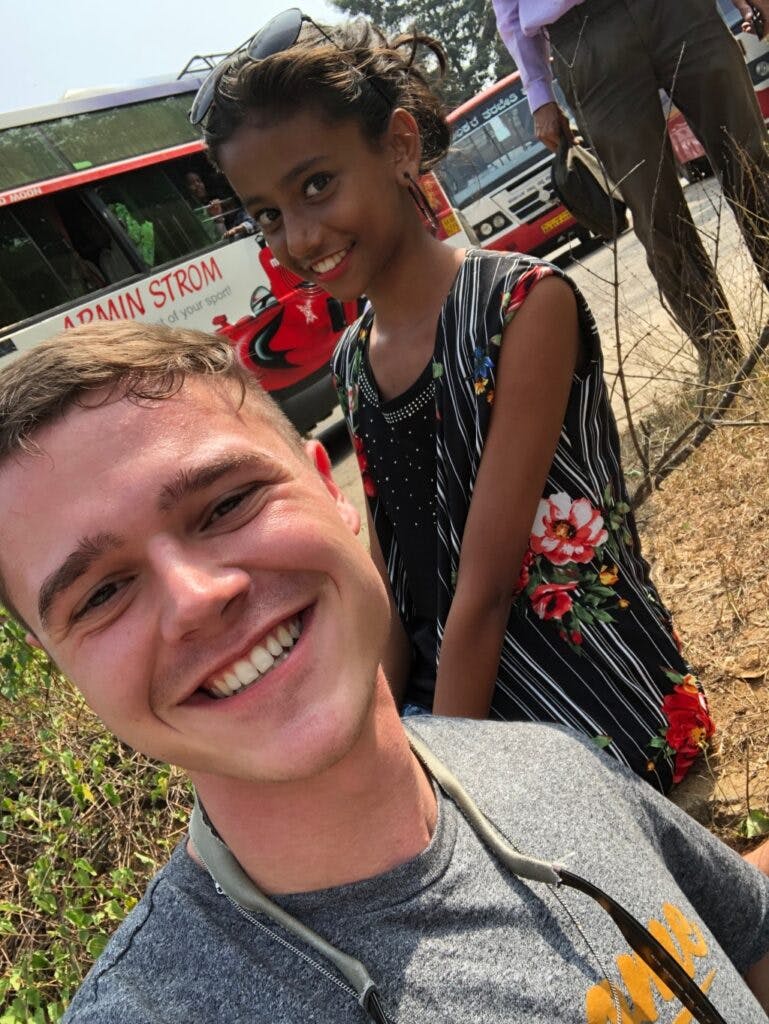Christmas Break Sojourn Delved into Medicine, Religion, Culture, Natural Resources and Food
Thomas “TJay” Burbage fondly recalls taking an anatomy course during his freshman year at Wilmington College with Dr. Savitha Krishna, assistant professor of biology. One day, class discussion deviated from the usual bones, muscles and organs to the faculty member’s native India.
PICTURED: Thomas "TJay" Burbage poses with an Indian girl during his Christmas break trip to India with Dr. Savitha Krishna. TJay obviously stood out among the inhabitants of the densely populated nation, resulting in numerous requests for photos.
The students asked her to speak a few words in her first language, a major Indian dialect known as Kannada. She first said, “I love science.” Soon, they inquired about such common words as “mother,” which is mataji.
Krishna quickly earned a special nickname with a cohort of her students, many of whom, like Burbage, also have taken her for such other courses as physiology and biochemistry.
“We’ve been very close to Savitha since day one in anatomy, so we started calling her mataji — mother. She’s my Indian mother, my mother on campus,” said Burbage, a senior athletic training major from Moscow, an Ohio River town in Clermont County.
Over several years, Burbage’s interest in Krishna’s India continued so he jumped at the chance to visit the sub-Asian continent on a study tour she and her husband, Dr. Sharath Krishna, associate professor of biology at Central State University, arranged over Christmas break.
“I told my parents I was really interested in going and they were really supportive of the trip,” he said, noting he raised a couple thousand dollars through a popular crowd-funding platform. Eight female CSU students joined Burbage on the journey that promised an enticing mixture of medical education, tourism, dynamic geography and rich culture.
Savitha Krishna said both she and her husband enjoy providing their students with special outside-the-classroom experiences.
“We like to share these experiences while visiting a different country: natural resources, food and culture, religious practices and tolerance, and supplementary medical practices,” she said. “These will eventually help our students’ holistic development and career choices.”
The initial part of the tour entailed three days at a medical college, where they delved into Ayurvedic medicine, which is among the world’s oldest holistic healing systems, developed more than 3,000 years ago in India. It’s based on the belief that health and wellness are contingent upon a subtle balance between mind, body and spirit.
Burbage learned about preventative practices and noninvasive therapy, and how herbal supplements are made from tree bark, leaves and roots. “It’s using nature for health,” he said.
The group then flew to New Delhi and drove four hours through the countryside to Agra, the site of the 16 resplendent palaces and gardens, including the Taj Mahal, which is known as one of the great wonders of the world. “The Taj Mahal was magnificent! At sunset, we watched it turn from white to red and then purple,” he added.
This part of the trip, in particular, gave the travelers a sense of the geographical and cultural diversity inherent the world’s second most populous country. They learned about the various religions practiced in India.
TJay was exposed to a plethora of religions that have had a peaceful coexistence for centuries — Budism, Jainism, Hinduism, Islam and Christianity have co-existed in harmony,” she said.
Food, of course, played a key role in their visit as they traversed Northern and Southern India. “I like Indian food, but it was different not eating beef for two weeks,” Burbage said, noting many Indians are vegetarian, as cows are considered sacred in India and are never killed for meat.
They also witnessed the biodiversity represented by the humid, tropical rainforests of the Western Ghats mountain range while visiting bird sanctuaries, a coffee plantation, coconut farm and pepper gardens. They viewed tiger courtships, crocodiles, tropical birds, butterflies and elephants.
Burbage recalled being anomaly in a country of 1.37 billion Indians. “There are so many people in India and I look so different from them. A lot of people, especially children, asked me to have my picture taken with them — it was like I was famous,” he said.
Certainly, spending Christmas in India was the most unusual experience on that holiday; however, the gift from his professor of experiencing her home nation will undoubtedly stay with him for a lifetime.
“Savitha wanted to show me what her life in India was all about,” he said. “I learned so much from her and her husband. Wilmington College is such a great community to have professors like her — it’s a family of students, faculty and staff.”
Burbage will graduate in May with plans to take a gap year during which he will work in a research lab at the University of Cincinnati while studying for his medical school entrance exam and apply to medical schools.
